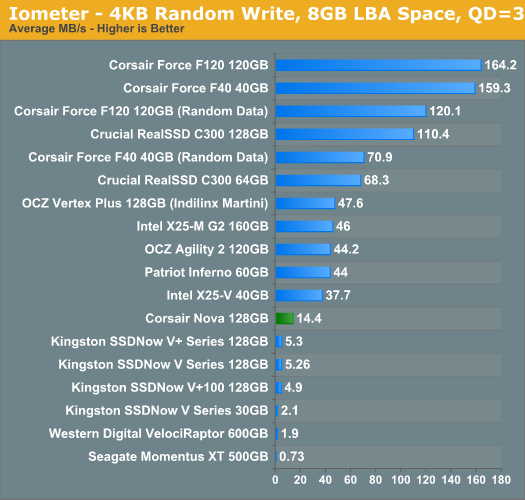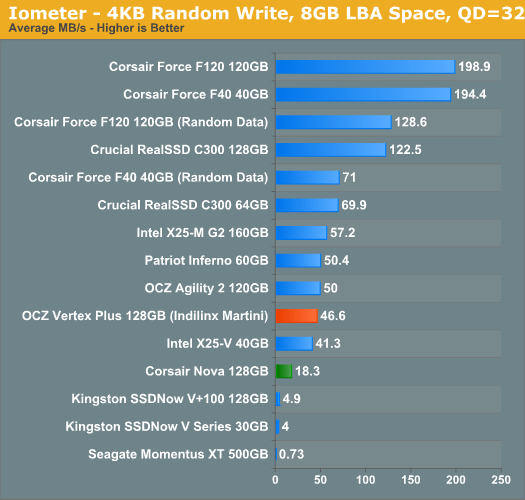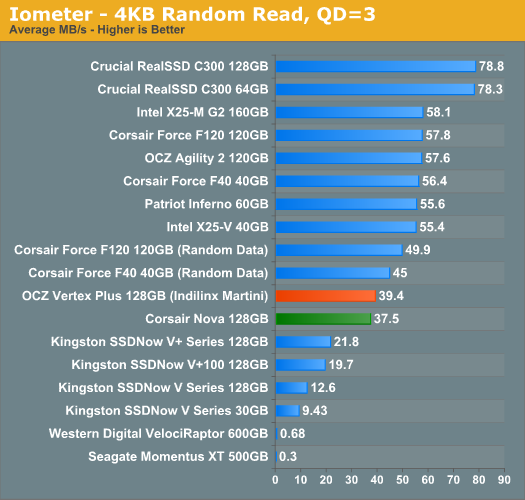OCZ Vertex Plus Preview: Introducing the Indilinx Martini
by Anand Lal Shimpi on November 16, 2010 9:31 AM EST- Posted in
- Storage
- SSDs
- OCZ
- Indilinx Martini
- Intrepid
Random Read/Write Speed
The four corners of SSD performance are as follows: random read, random write, sequential read and sequential write speed. Random accesses are generally small in size, while sequential accesses tend to be larger and thus we have the four Iometer tests we use in all of our reviews.
Our first test writes 4KB in a completely random pattern over an 8GB space of the drive to simulate the sort of random access that you'd see on an OS drive (even this is more stressful than a normal desktop user would see). As I've explained in the comments in previous reviews, simulating the type of random access you see in a desktop workload is difficult to do. Small file desktop accesses aren't usually sequential but they're not fully random either. By limiting the LBA space to 8GB we somewhat simulate a constrained random access pattern, but again it's still more random than what you'd see on your machine. Your best bet for real world performance is to look at our Storage Bench charts near the end of the review as they accurately record and play back traces of real world workloads.
For our random access tests I perform three concurrent IOs and run the test for 3 minutes. The results reported are in average MB/s over the entire time. We use both standard pseudo randomly generated data (data is random within a write, but duplicated between writes) for each write as well as fully random data (data is random within a write and random across most writes) to show you both the maximum and minimum performance offered by SandForce based drives in these tests. The average performance of SF drives will likely be somewhere in between the two values for each drive you see in the graphs. For an understanding of why the type of data you write to SF drives matters, read our original SandForce article.

The Corsair Nova is our Indilinx Barefoot representative in this preview and you can see how performance has improved with the Martini controller. While the original Indilinx Barefoot traded good sequential performance for slower-than-Intel random performance, Martini fixes the problem. It's not in the class of SandForce's SF-1200, but Indilinx appears to have built a performance equal to Intel's X25-M G2.
Many of you have asked for random write performance at higher queue depths. What I have below is our 4KB random write test performed at a queue depth of 32 instead of 3. While the vast majority of desktop usage models experience queue depths of 0 - 5, higher depths are possible in heavy I/O (and multi-user) workloads:

Our random read test is similar to the random write test however we lift the 8GB LBA space restriction:

Random read performance falls short of Intel and basically hasn't changed since the Barefoot. It's not bad at all, but not industry leading.










61 Comments
View All Comments
landerf - Tuesday, November 16, 2010 - link
What SSD does Anand use personally? I see a lot of user remarks saying they've switched from this or that brand and noticed a feeling of improvement in everyday use, something that may be hard to quantify just looking at benchmarks.Zoridon - Wednesday, November 17, 2010 - link
They need to come out with a 1 TB 3.5 inch version of the Momentus XT with two 500 gb platters and 8 gigs of flash memory. Basically double up on the current 2.5 inch XT for desktops. They could charge 50 percent more for the drive over current 1TB drives and increase desktop performance greatly without sacrificing storage capacity. If they do that I'd raid two in raid 0 and give the finger to SSDs for a few years. They could update to 2TB drives after 6 months for another wave of performace / storage goodness. Am I the only one wanting a destop version of the Momentus XT with these type of stats at an affordable price?Qapa - Wednesday, November 17, 2010 - link
1 - Probably the most important one: when are we going to see the promises price cuts due to the move to lower nm? It was supposed to be this quarter right...?2 - When is the Jet Stream now supposed to come out? (and this also questions the sanity of creating this new Martini, and the effort put into this one which for sure delayed even more Jet Stream...)
3 - I read somewhere that Intel G3 was put on hold due to the presentation of SandForce 2000 series?
4 - When is this SandForce 2000 series expected to come out?
I want a new generation SSD with 64Gb @ around $64!!
iwodo - Wednesday, November 17, 2010 - link
Again we are seeing the same thing.While i would love to trust the benchmark from IOmeter as the raw power of SSD. PC Mark, Sysmark and Anand Test Bench are MUCH closer to real work test, or real work usage scenario.
And after the shocking results from Toshiba new Controller which nearly wins all real world test, the new firmware from indilinx seems to be doing the same as well.
I dont know what is missing, but the preview certainly tells you being the fastest in BOTH Seq Read Write and Random Read Write does not AUTOMATICALLY translate to fastest in real world scenario.
I know a lot of people are focusing on Iometer test, but i to me i have been paying much more attention to Anand Bench.
vailr - Wednesday, November 17, 2010 - link
Version 260.99 WHQL is the most current driver.MHz Tweaker - Wednesday, November 17, 2010 - link
I purchased a pair of of 60gb Vertex 2's about 6 months ago when there was a email blast sale at "The Egg"For the most part I am VERY pleased with my purchase. What I am not pleased with is all the crap I have to go through to make sure I get the best performance.
Example: Booting various Win7 DVD's in order to clean the SSD's followed by booting a USB flash drive version of Ubuntu in order to do a secure erase. Granted, these could be considered performance tweaks but who doesn't want every ounce of speed for their money.
My SSD's came with 1.11 firmware which has performed admirably. Just this past weekend I did my 6month re-install of Win7 x64 and of course with most versions of Windows it feels like a new PC again.
The top of my wish list would be some type of RAID supported TRIM function for these drives, other than that it has been smooth sailing for me. Oh, also I set aside an extra 20gb for spare area in the RAID 0 array to give me 100gb vs. the 120 the pair would normally give. I really don't miss the extra 20gig as I have 9 other hard drive in my box totaling 14TB of storage.
later
MHz
ClagMaster - Wednesday, November 17, 2010 - link
Since there is no indication the controller chip has been changed, the improvement must be from a careful rebalancing of the driver optimizations. The performance gains obtained from this optimization is impressive to say the least.For general usage, PCMARK shows very good performance relative to the Intel and C300 offerings.
The OCZ Vertex Plus offers very good performance for the cost, but at ~$2/GB is still pricy.
ehume - Thursday, November 18, 2010 - link
I get the feeling these tests were all run SATA II/3Gb. Yet the C300 is capable of using SATA III/6Gb. How would the results compare?So far it looks like the Corsair Force 100 is at or near the top in most of the tests. Given that the Force 40 is usually not far behind, the Force 80 looks like a good buy at the right size.
But would the C300 do a lot better on a SATA III motherboard? Or would the SATA contribution not make much difference here?
Hrel - Tuesday, November 23, 2010 - link
I really wish you guys would put two 7200rpm drives with 64MB of cache configured in a Stripe RAID in these performance charts for comparison. Or at least mention the score below the chart since it'd probably mess up the bars. While I know the random stuff would still be WAY lower, I'm curious what PCMark would say about system performance and how sequential activity would compare.gaspard - Friday, November 26, 2010 - link
Samsung 470 Series... would be great to see a review.It's the "other" controller that is up with SF, C300, Intel, Martini...